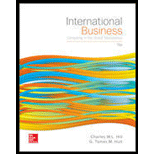
Case summary: The case portrays the progressions in Country U’s automaker Company F's worldwide strategy after previous Company B’s official, Person X, was designated as CEO in the year 2006. At the point when Person X came to Company F, he was stunned to discover that the organization planned and assembled distinctive autos for various locales. This long-lasting technique of territorial models depended on the suspicion that shoppers in various districts had diverse tastes and services, which required extensive neighbourhood customization. This methodology brought about high expenses. Company F was compelled to reassess its methodology after the 2008-2009 worldwide financial crisis incited a precarious decrease in worldwide car sales. The outcome was Person X's One Company F strategy, which intends to make a bunch of auto stages that Company F can utilize wherever on the planet. This empowers the organization to accomplish scale economies and offer learning crosswise over nations, which together, lessen costs. In the year 2014, Person Y was named CEO of Company F. A long-term Company F representative, Person Y's point of view on Company F's technique going ahead was in a state of harmony with Person X's One Company F approach. Person Z, a previous furniture business official, assumed control over the reins at Company F in 2017. A few experts foresee Company H will take Company F in an alternate course, and that oneself driving will be a noticeable component later on Company F line-up.
Characters in the case: Company F, Company H, Company B, Country U, Person Y, Person X, Person Z.
To Discuss: The recommendations that Company F undertakes in terms of continuing or possibly changing the global strategy that Person X initiated and whether Person Z’s long-term employment with Company F a benefit or hindrance to making Company F globally competitive.
Introduction: A global strategy is one that an organization takes when it needs to contend and extend in the worldwide market. It is a strategy organizations seek after when they wish to extend universally.
Want to see the full answer?
Check out a sample textbook solution
Chapter IC Solutions
International Business: Competing in the Global Marketplace
- Need answerarrow_forwardGeneral Accounting Questionarrow_forwardAccounting Question: Lexington Enterprises requires $750,000 in assets and will be 100% equity financed. If the Earnings Before Interest and Taxes (EBIT) is $60,000 and the tax rate is 25%, what is the Return on Equity (ROE)? Need helparrow_forward
 BUSN 11 Introduction to Business Student EditionBusinessISBN:9781337407137Author:KellyPublisher:Cengage Learning
BUSN 11 Introduction to Business Student EditionBusinessISBN:9781337407137Author:KellyPublisher:Cengage Learning Essentials of Business Communication (MindTap Cou...BusinessISBN:9781337386494Author:Mary Ellen Guffey, Dana LoewyPublisher:Cengage Learning
Essentials of Business Communication (MindTap Cou...BusinessISBN:9781337386494Author:Mary Ellen Guffey, Dana LoewyPublisher:Cengage Learning Accounting Information Systems (14th Edition)BusinessISBN:9780134474021Author:Marshall B. Romney, Paul J. SteinbartPublisher:PEARSON
Accounting Information Systems (14th Edition)BusinessISBN:9780134474021Author:Marshall B. Romney, Paul J. SteinbartPublisher:PEARSON
 International Business: Competing in the Global M...BusinessISBN:9781259929441Author:Charles W. L. Hill Dr, G. Tomas M. HultPublisher:McGraw-Hill Education
International Business: Competing in the Global M...BusinessISBN:9781259929441Author:Charles W. L. Hill Dr, G. Tomas M. HultPublisher:McGraw-Hill Education





